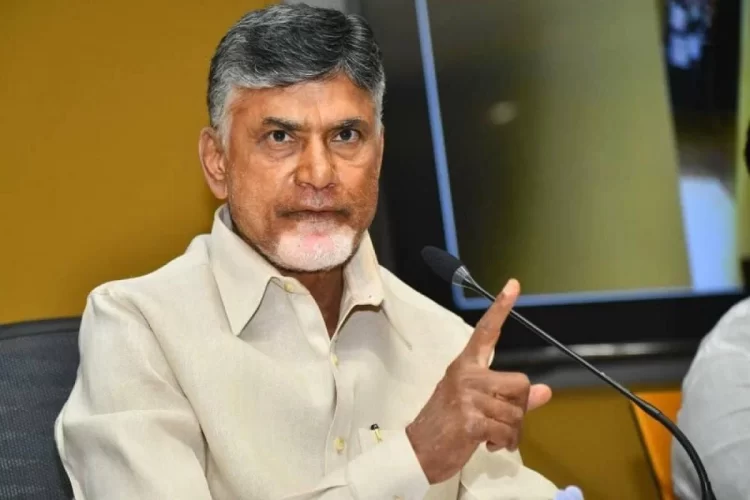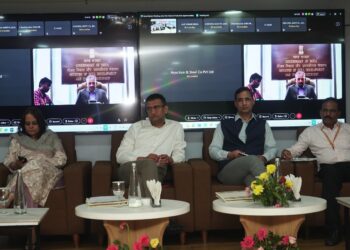Former Andhra Pradesh Chief Minister apprehended amidst controversy.
NEW DELHI (India CSR Correspondent): N Chandrababu Naidu, the former Andhra Pradesh Chief Minister and the Telugu Desam Party (TDP) chief, has been arrested by the Criminal Investigation Department (CID) regarding the Andhra Pradesh skill development scam case. This high-profile arrest has stirred up significant controversy and political unrest in the region.
Naidu’s Statement
Following his apprehension, Chandrababu Naidu vehemently defended himself, stating that he had done no wrong. In his words, “I’m requesting both the people and the cadres, I haven’t done anything wrong today… This is very sad and wrong.” He reiterated his unwavering commitment to the Telugu people, pointing out that he’s served them selflessly for the past 45 years.
The Skill Development Scam
An FIR regarding the scam was filed in 2021. The case is said to involve a staggering Rs 371 crore. Naidu is accused of orchestrating this scam via the Andhra Pradesh State Skill Development Corporation (APSSDC), a scheme to train the unemployed youth of the state. However, a significant point of contention is the fact that the FIR report did not mention Naidu’s name, which his advocates highlighted.

Arrest Procedure and Aftermath
Naidu’s arrest took place under Section 50 (1) (2) of the Code of Criminal Procedure (CrPC) early on Saturday. Notably, the sections under which he was arrested are non-bailable. The former Chief Minister will soon be produced before the court. Ganta Srinivasa Rao, TDP MLA and former minister, who was also arrested, called this arrest a result of “political vendetta”, pointing out that Naidu has been a respected figure in Indian politics.
Leaders Condemn Naidu’s Arrest
The political turmoil was evident when Nara Lokesh, son of Chandrababu Naidu and TDP’s National General Secretary, staged a protest in the wake of his father’s arrest. Leaders from other political parties joined the chorus of dissent. Andhra Pradesh BJP president, Daggubati Purandeswari, expressed her disapproval, pointing to the absence of proper procedure in Naidu’s arrest. The Communist Party of India (CPI) State Secretary, K Ramakrishna, also condemned the arrest, questioning the necessity of the midnight ruckus by the police.

Political Implications
The swift and controversial arrest of Naidu has placed a magnifying glass over Andhra Pradesh’s political dynamics. Historically, the state has seen intense political battles, primarily between the TDP and the YSR Congress Party. With the CID’s intervention and subsequent arrest, allegations of political vendetta have been rife.
The event’s political implications go beyond just the two parties involved. As the narrative unfolds, it also poses questions about the role and neutrality of enforcement agencies. With leaders across party lines expressing concern over the handling of the arrest, there is a broader discussion emerging about the balance of power and the potential misuse of authority.
Public Sentiment
The reaction of the public has been equally mixed. While many staunch TDP supporters view this arrest as a politically motivated move to discredit Naidu and his legacy, others believe that the arrest might reveal deeper layers of corruption that were previously hidden from public view.
Local and social media are abuzz with debates, discussions, and demonstrations. Protests by TDP cadres and supporters in various parts of the state showcase the deep-seated loyalty and faith they have in Naidu’s leadership.
The Legal Battle Ahead
As the political drama unfolds in the public eye, a parallel battle will take place in the courts. Naidu’s legal team is likely to challenge the legitimacy of the arrest, pointing to the discrepancies in the FIR and the overall procedure followed. The absence of his name in the FIR will undoubtedly be a focal point in the legal arguments to come.
The state’s prosecution will be under immense pressure to present concrete evidence linking Naidu to the scam, especially given the high-profile nature of the case and the intense public scrutiny.
Future of Andhra Politics
With Naidu’s arrest, the political landscape of Andhra Pradesh stands at a crossroads. If Naidu is exonerated, it may lead to a resurgence of the TDP and could position them favorably in future elections. On the other hand, if the legal proceedings validate the allegations, it might significantly weaken the TDP’s hold, allowing the YSR Congress Party and other political entities to consolidate their power further.

What is the Andhra Pradesh Skill Development scam?
The Andhra Pradesh skill development scam is a multi-crore corruption case that allegedly took place during the tenure of the Telugu Desam Party (TDP) government in the state. The scam involves the diversion of funds meant for skill development programs to private companies.
The scam came to light in 2018, after a whistleblower complaint to the Anti-Corruption Bureau (ACB). The ACB investigation revealed that the state government had released Rs. 371 crore to Designtech Systems Private Limited (DTSPL), a private company, for a skill development project. However, the investigation found that DTSPL had not actually implemented the project and had instead diverted the funds to other companies.
The ACB filed a chargesheet against several people, including GVS Bhaskar, a former employee of Siemens, who was allegedly the mastermind of the scam. The Enforcement Directorate (ED) has also registered a case under the Prevention of Money Laundering Act (PMLA) and has attached properties worth Rs. 31 crore belonging to DTSPL.
The scam has caused a major embarrassment to the TDP government and has led to calls for the resignation of former Chief Minister Chandrababu Naidu. Naidu has denied any wrongdoing and has accused the current government of political vendetta.
The case is currently being investigated by the ACB and the ED. It is still not clear how much money was actually involved in the scam and who all are involved. However, the case has highlighted the need for greater transparency and accountability in the use of public funds.
Here are some of the key allegations in the Andhra Pradesh skill development scam case:
- The state government released Rs. 371 crore to DTSPL for a skill development project, but the project was never implemented.
- DTSPL diverted the funds to other companies, including shell companies.
- The scam was allegedly masterminded by GVS Bhaskar, a former employee of Siemens.
- Several other people, including government officials, are also alleged to be involved in the scam.
The case is still under investigation, but it is clear that it is a major corruption scandal that has caused a lot of damage to the reputation of the TDP government.

Who is N. Chandrababu Naidu?
N. Chandrababu Naidu: A Glimpse into His Political Journey
Early Life and Education
N. Chandrababu Naidu (born 20 April 1950) hailed from Naravaripalli, a quaint village situated in the Guntur district of Andhra Pradesh. An engineer by education, he pursued his studies at the renowned Sri Venkateswara University and subsequently embarked on a career as a software engineer in the United States.
Entry into Politics
In 1982, answering a calling to serve his homeland, Naidu returned to India, plunging into the turbulent waters of politics. Just a year later, in 1983, he clinched a victory, marking his entry into the Andhra Pradesh Legislative Assembly.
Rise within the TDP
The 1980s witnessed Naidu’s meteoric rise in the Telugu Desam Party (TDP). His leadership skills and political acumen earned him the party president’s title in 1995. This was a precursor to his party’s victory in the state elections that very year, catapulting him to the Chief Minister’s chair.
First Term as Chief Minister: Focus on Economic Development
Naidu’s tenure as Chief Minister was characterized by an unrelenting focus on economic growth. His visionary policies saw the birth of institutions like the Andhra Pradesh Industrial Infrastructure Corporation (APIIC) and the Andhra Pradesh Economic Development Board (APEDB). Moreover, he was instrumental in fostering the growth of information technology and biotechnology sectors in Andhra Pradesh.
Re-election and Continued Reforms
1999 marked Naidu’s re-election as the Chief Minister. Unwavering in his commitment, he not only persisted with his economic initiatives but also ushered in social reforms. These included the provision of free primary education and the expansion of healthcare services for the state’s residents.
A Setback in 2004
The winds of politics are unpredictable. In 2004, Naidu tasted defeat at the hands of the Indian National Congress. Nonetheless, he retained his leadership position within the TDP, steering the party from the opposition benches.
Return to Power in 2014
A decade later, in 2014, Naidu’s political fortunes revived. Leading the TDP to a triumphant victory, he once again assumed the role of Andhra Pradesh’s Chief Minister. This term was marked by challenges as he navigated the state through its bifurcation in 2014, concentrating on infrastructural development and upliftment of the state’s rural zones.
2019: A Shift in Power
However, 2019 brought another twist, with the YSR Congress Party emerging victorious. While Naidu had to step down from the Chief Minister’s office, he retained his leadership within the TDP, leading it as the opposition party.
Controversies and Legacy
Naidu’s journey, while filled with commendable achievements, has not been without its share of controversies. While many laud him for his economic vision and unwavering commitment to the state’s development, critics point to his alleged authoritarian style and potential involvement in corruption scandals.
(India CSR)




















